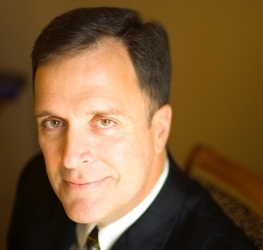As part of my leadership styles interview series, I’m happy to now feature the best-selling author and international speaker, Mark Sanborn.
[stextbox id=”custom”] Mark Sanborn is president of Sanborn & Associates, Inc., an idea studio dedicated to developing leaders in business and in life. Mark is an international bestselling author and noted authority on leadership, team building, customer service and change. Mark is the author of eight books, including the bestseller The Fred Factor: How Passion In Your Work and Life Can Turn the Ordinary Into the Extraordinary which has sold more than 1.6 million copies internationally. His other books include You Don’t Need a Title to be a Leader: How Anyone, Anywhere Can Make a Positive Difference, Teambuilt: Making Teamwork Work, The Encore Effect: How to Achieve Remarkable Performance in Anything You Do, and Up, Down or Sideways: How to Succeed When Times are Good, Bad or In Between. His latest book is Fred 2.0: New Ideas on How to Keep Delivering Extraordinary Results and was recently released in March 2013. Be sure to follow him on Twitter and Facebook.[/stextbox]
Mark Sanborn is president of Sanborn & Associates, Inc., an idea studio dedicated to developing leaders in business and in life. Mark is an international bestselling author and noted authority on leadership, team building, customer service and change. Mark is the author of eight books, including the bestseller The Fred Factor: How Passion In Your Work and Life Can Turn the Ordinary Into the Extraordinary which has sold more than 1.6 million copies internationally. His other books include You Don’t Need a Title to be a Leader: How Anyone, Anywhere Can Make a Positive Difference, Teambuilt: Making Teamwork Work, The Encore Effect: How to Achieve Remarkable Performance in Anything You Do, and Up, Down or Sideways: How to Succeed When Times are Good, Bad or In Between. His latest book is Fred 2.0: New Ideas on How to Keep Delivering Extraordinary Results and was recently released in March 2013. Be sure to follow him on Twitter and Facebook.[/stextbox]
Leadership Styles
Each of the leaders featured in my leadership styles interview series was asked to provide his or her own unique answers to seven specific questions. Mark’s answers are located below. Be sure to leave a comment at the end of this article about which of his answers you found most fascinating…and why.
- How do you personally define leadership?
- In your opinion, what makes a successful leader stand out from the crowd of mediocrity?
- What was the defining moment(s) in your life that caused you to focus on personal development in order to become a more effective leader?
- Which areas of personal growth are your main strengths and which are your weaker ones?
- What habits have you included in your daily routine to strengthen your leadership skills?
- If you could travel back in time and speak with your “younger self, what would you encourage your “younger” self to change, alter or focus on more?
- What advice would you give to someone who wanted to become a more influential leader in their niche or organization?
 1) How do you personally define leadership?
1) How do you personally define leadership?
I have two definitions. The first is that leadership is an invitation to greatness that we extend to others. We as leaders–and the organizations we lead–have a commitment to being better than average or good; we aspire to and pursue greatness. If you, as an employee or potential employee, aspire to be better than you’ve ever been, then join us.
The second definition I use is that leadership takes individuals and organizations from where they are to where they could be. They move those they lead closer to their true potential. Leadership results in growth and progress.
I believe the question a leader should ask him- or herself at the end each day is, “Who or what is better because of me?”
2) In your opinion, what makes a successful leader stand out from the crowd of mediocrity?
It begins with commitment and ends in action. Many people “feel” or “think” like leaders, but they aren’t committed to doing the hard work of leading. It is deciding to do something about what you believe. I like the saying that beliefs are things you hold, but convictions are things that hold you. Leaders have deep convictions that compel them to act, but also sustain them during challenging times.
3) What was the defining moment(s) in your life that caused you to focus on personal development in order to become a more effective leader?
Beginning in the fourth grade, I competed in many public speaking contests. It was in those competitions that I realized the power that words have to move people. And while effective speaking and communication skills aren’t the only skills of a good leader, they are primary.
When I saw that I could positively influence others through the spoken word, I become interested in the other aspects of leadership and influence. That got me started on my study of leadership, and ended in my own leadership experiences in several organizations as well as my own business.
4) Which areas of personal growth are your main strengths and which are your weaker ones?
While I am very capable of being detail-oriented, I prefer big picture thinking. I’m better at conceiving ideas and plans than dealing with the details of implementation. When necessary, I both conceptualize and implement, but I do try to work with others who have both an interest and ability in the finer nuances of projects and what needs to be done.
I also prefer function over form. It is wonderful when both form and function—stye and utility—are exceptional. But I have always believed that a good idea implemented well is better than a brilliant idea never implemented.
5) What habits have you included in your daily routine to strengthen your leadership skills?
Commitment and conviction means we should be daily studying and learning as well as doing those things that are important. Since leaders need both information and inspiration, I read both the news as well as inspirational works, whether non-fiction books on motivation, biography or autobiography. I don’t just want to just learn what successful people think; I want to learn how successful people think.
6) If you could travel back in time and speak with your “younger self, what would you encourage your “younger” self to change, alter or focus on more?
I would tell my younger self that I’d never lose anything I gave away. Savings and investing are important, but there are no guarantees. When we help others, by giving our time and money, that philanthropy is never lost by a downturn in the stock market.
I’d also make sure I was more consistent in building a database or tracking system for all the contacts and people I’d do business with in the coming years. The ability to make and keep connections is so important, and technology has made it easier to organize those important contacts but we’ve got to be disciplined in using the technology.
7) What advice would you give to someone who wanted to become a more influential leader in their niche or organization?
Four ideas:
First, find a mentor. Ideally that will be a person you respect and who is willing to share advice and insight with you. If you can’t get a formal mentor, pick someone to study and learn from, even if at a distance.
Second, mentor someone with less experience than yourself. Find someone you can invest in, and share your insights to help them become better.
Third, champion an important cause. Have a decided point of view that matters to you, and get it to matter to others. You know you’ve been successful when you can must support for that cause and get others to take action.
Finally, pick a problem within your organization to help solve. Whether you form a task force, or tackle it by yourself, you’ll demonstrate your leadership ability (and increase it) when you become a problem solver.


Mark, thanks for doing this interview. Your answers are thought-provoking, wise, and inspirational.